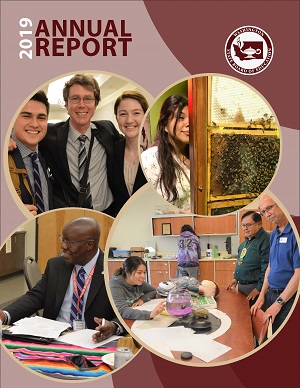Annual Report: Strategic Plan Update
Release Date:
The 2019 – 2023 Strategic Plan establishes five priority areas for the Board and our education system. The intent of the strategic plan is to focus the work of the Board and the agency staff on key priorities within the Board’s scope of responsibility, which includes advocacy and strategic oversight of public education. The actions and priorities outlined in the plan were established following an extensive public engagement process and are grounded in a set of values adopted by the Board. The priorities are intended to achieve the Board’s vision of an education system where students are engaged in personalized education pathways that prepare them for civic engagement, careers, post-secondary education, and lifelong learning.
strategic oversight of public education. The actions and priorities outlined in the plan were established following an extensive public engagement process and are grounded in a set of values adopted by the Board. The priorities are intended to achieve the Board’s vision of an education system where students are engaged in personalized education pathways that prepare them for civic engagement, careers, post-secondary education, and lifelong learning.
The Board recognizes that the persistent challenges we face as a state and nation in our education system cannot be addressed without partnership and collaboration with other agencies and organizations who share the responsibility to develop equitable policies and programs, and deliver on the promise of an education system that is designed to meet the individual needs of the students we serve. There is a great deal of synergy among educational partners in Washington, and SBE’s plan calls out a number of actions and initiatives that are being developed and led by other organizations.
This annual report identifies examples of progress since the Board adopted the plan in November 2018. This is not intended to be a comprehensive catalog of all the great work occurring throughout our system. Rather, this report is an opportunity to highlight a few bright spots as well as signal areas that need further attention and share some of the ongoing or emerging work that will occur over the next year. See highlights from the report below.
Finally, the report includes a brief discussion on how SBE will deploy its resources over the next fiscal year to make progress on our strategic plan and agency responsibilities.
Sincerely,

Randy Spaulding
Executive Director
Washington State Board of Education
Highlight indicators include:
Student Well-being
- The average percentage of students experiencing at least one exclusionary disciplinary event decreased by .7 percent from the 2017 school year to the 2018 school year.
- The exclusionary discipline rate declined for 62 of 223 (28 percent) school districts.
- However,
- From 2008 to 2018, the percentage of 10th grade students considering attempting suicide increased from 17 to 23 percent in Washington.
- After declining over an eight-year period, the percentage of 6th grade students who do not feel safe at school increased from 10 to 15 percent.
- However,
Work ahead:
- SBE supports the collection and use of school climate and culture data primarily for school improvement and, in collaboration with OSPI and EOGOAC will be exploring other uses in school recognition and accountability.
- The agency will participate in the Social Emotional Learning Work group established in SB 5082.
- The Board is working with partner agencies through the Learning First Alliance to develop shared resources to address the need for mental health awareness for students, educators, and families. This work is drawn from a student-led effort and resolution passed by the Board in March 2019.
Student Transitions and Diploma
- The number of high school graduates successfully transitioning to post-secondary educational opportunities increased for six of seven reported race/ethnicity student groups. The overall increase was 1983 additional students moving on to further education. Of those:
- 45 percent identified as Latinx, and
- 69 percent participated in the Free or Reduced Price Lunch program.
Work ahead:
- The Board received funding to support the work of the Mastery-based Learning Work group. Over the next year and a half, Board staff will be engaging with a diverse work group to craft a set of recommendations that likely will result in a policy framework to support an alternative to the credit-based graduation requirements, instead recognizing an individual student’s mastery of the state learning standards through authentic learning opportunities.
- The Board is seeking funding to allow local districts to develop and share models for a credit-bearing course that support a student’s development of High School and Beyond Plan and that integrates the Financial Education standards along with other life skills curricula to allow students to earn credit as they develop and refine their High School and Beyond Plan.
Download the PDF of SBE's 2019 Annual Report to read more about SBE priorities, indicators, progress and work ahead.
Media Contact:
Stephanie Davidsmeyer
Communications Manager
(360) 725-6035





